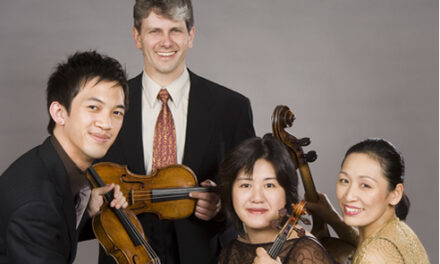On a most pleasant evening following a period of sweltering summer heat, the North Carolina Symphony presented an all-classical Summerfest concert at Cary’s Koka Booth Amphitheatre. The concert, titled “Romantic Russian Nights,” opened with Modest Mussorgsky’s exquisite “Dawn on the Moscow River” – the introduction to his opera, Khovanschina. Essentially a tone poem, the piece provides an effective visual backdrop for the opera that is to follow. Opening with quiet stirrings in the woodwinds and building to a gorgeous melody in the strings, it invites the listener to visualize the birds twittering, the flow of the river, the majestic and glorious minarets, the awakening of the great city – and then the music quietly floats away, at the beginning of a new day. The performance by our great North Carolina Symphony brought the music alive and left chills of delight on this most perfect summer evening.
The guest conductor for this performance was Ruth Reinhardt, native of Saarbrücken, Germany. She is currently finishing her Master of Music degree in conducting at the Juilliard School, where she studies with Alan Gilbert. Reinhardt was appointed chief conductor of the Lincoln Center Chamber Orchestra for the 2014-2015 season. She has also had other significant conducting engagements. Reinhardt was an impressive figure on the podium wearing a white waistcoat and black trousers. Her command of the orchestra and her thorough musical knowledge were apparent throughout the concert.
The next selection on the program was a collection of delightful dances from Tchaikovsky’s Swan Lake, Op. 20a. The orchestra roiled the twirling inventive dances effectively, and there was some fine solo work, notably from the trumpet and oboe.
Rachmaninoff’s lovely “Vocalise,” Op. 34, No. 14, unwound its languid melody like white clouds against a blue sky. It was a reminder of what a perfect evening we were having. The gorgeous selection of music added rapture to the “Romantic Russian Nights” theme of the concert.
The first half of the concert concluded Alexander Borodin’s rousing “Polovtsian Dances” from the opera Prince Igor. The orchestra let loose its focused energy in exuberant pleasure.
The second half of the concert was given over to a performance of Rachmaninoff’s Piano Concerto No. 3 in D minor, Op. 30. The 1996 motion picture Shine focused considerable attention on it. The movie documents Australian pianist David Helfgott’s struggle with mental illness and meeting the challenges of the formidable “Rach 3.” I have heard that some pages of the piano score are more black than white because of the use of massive three and four note chords in both hands played at a rapid pace. Pianist Gary Graffman is said to have lamented he had not learned this concerto as a student, when he was “still too young to know fear.”
Our brave soloist in Cary was Daniel Hsu, who just turned 21 (June 27). He captured the bronze medal and prizes for best performance of both the commissioned work and chamber music at the fifteenth Van Cliburn International Piano Competition. Hsu is also a 2016 Gilmore Young Artist, and first prize winner of the 2015 Concert Artists Guild Victor Elmaleh Competition. He is increasingly recognized for his easy virtuosity and bold musicianship. The Philadelphia Inquirer characterized him as a “poet… [with] an expressive edge to his playing that charms, questions, and coaxes.”
The pianist poised his hands over the keyboard as the orchestra introduced the gentle opening theme which he joined in as it developed. Very soon his fingers were dancing at breakneck speed over the middle section of the keyboard and the journey was on. Technical virtuosity and lilting lyrical expressiveness were on display to the thrill of the large audience. The first movement progresses through a second theme, mostly gentle and lyrical in nature. A return to the opening theme develops into a stormy passage and a chordal cadenza of massive demands after which the woodwinds restate the second theme while sparkling arpeggios are supplied by the piano. The movement ends quietly and calmly. The second movement consists of a number of variations around a single lush and romantic melody following one another and leading without pause into the third movement, which is quick and vigorous and contains variations on many of the themes that are used in the first movement, thus uniting the concerto. There are some stormy episodes and daunting chordal passages though lighter than the first movement cadenza. The movement concludes with a triumphant and passionate second theme melody in D major.
Hsu received and deserved a vigorous ovation for his performance, and he responded with a spell-binding performance of “Träumerei” from Schumann’s Kinderszenen, Op. 15. The vast crowd was transfixed as Hsu coaxed the dream into an awesome gift to take home. Reinhardt and the musicians of the N.C. Symphony also deserve a heaping portion of accolades.
Summerfest continues through July 21. For details, see our calendar.











